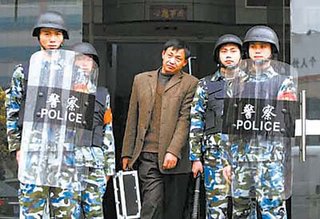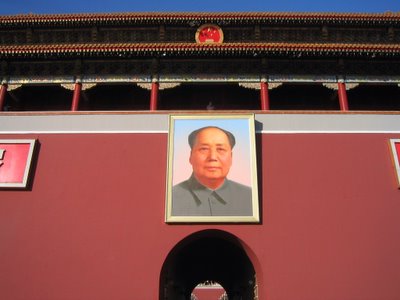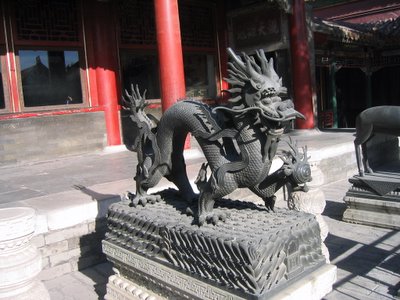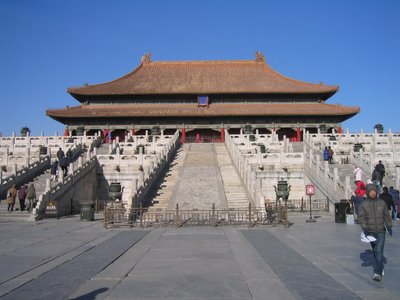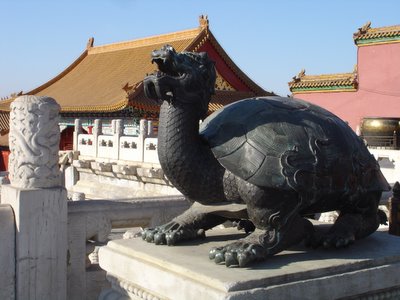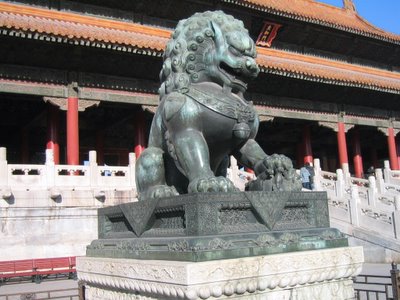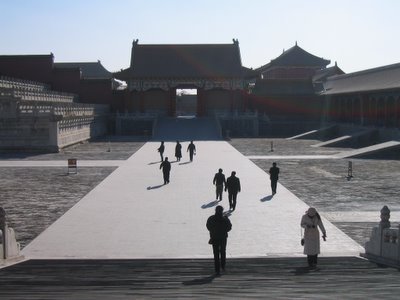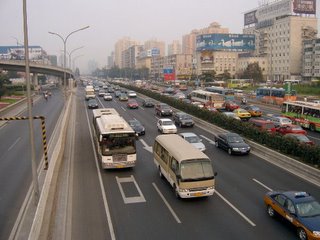Now you may have heard some things about religion being banned in China. I'm sure we have all heard the story of the Falun Gong. There have been stories of religious groups being arrested and tortured, but what I saw in the middle of Beijing was a florishing Muslim district.
I also saw Muslim mosques and Christian churches in China. There are also buddhist temples everywhere there. There is religion in China. Now to what extent people are allowed to practice their religions, that is something I did not investigate. I just wanted to let you know that at least there is some religious expression in China.
Sunday, January 22, 2006
Sunday, January 08, 2006
Currency and Banking
The currency in China is called RMB, and the units are called yuan. Six yuan is about equal to one Canadian dollar. Recently, the newly printed currency features the image of Chairman Mao on one side. On some of the older bills, they featured the various different ethnic groups living in China. (I was shocked to find that there are MANY different ethnic groups within China, as the general perception is that we are one homogenous ethnic group.)
My main complaint with money in China was the dependency on physical money. Personal cheques cannot be trusted, due to the skillful arts of forgery and counterfeit in China. Credit cards are not widely accepted in China. If they are accepted, it's usually a Chinese credit card and not Visa or Mastercard or even American Express (so you can actually leave home without it). In a nutshell, if you are in China, you HAVE to use Chinese credit cards. I was able to make a Visa purchase at one of the major shopping malls. This mall was catered to tourists though, and had prices that were well above local standards.
This leads me into a discussion on the current state of the banking system in China. The banking system in China is a bureaucratic nightmare. There are line-ups, and banks have you take a number. The problem is that many people ignore this system and march right up to the tellers while they are serving someone else, and basically get the teller to serve them instead. This was a frequent occurance that I've seen happen at least once every 2 minutes. In North America, such people would be scolded by either the bank staff or the customers, but apparently they are unchallenged in China.
Another problem is with networking bank branches. While all the banks are networked within a city, none of them are networked between cities except for one. Banks also do not regularly handle currency exchanges, except for one. Unfortunately, these banks are not identical. Therefore, if you would like to exchange currency in a strange city and deposit it into your local bank account, you would have to exchange at one bank, and deposit the money in another. In addition, China is very strict about currency exchanges. It's not something that is easy to do, and it requires forms to be filled out. As a result, foreign currency in China is not widely accepted. In a nutshell, if you're in China, you HAVE to use Chinese currency. It's a very smart thing for the government to do, as reinforces the value of currency within China. Unfortunately, it makes things very difficult for tourists.
The dependence on physical money is difficult for business owners as well. Large business transactions may have to be done using paper yuan, which occasionally leads to situations where people with briefcases full of money have to hired guards to protect them as they carry it back and forth.
I was told that some businesses bypass the Chinese banking nightmare by opening accounts with Hong Kong banks. It's not a bad idea, because having guards to escort your briefcase of money around is a pretty silly thing to have to do in a country that's supposed to be the next economic power.
My main complaint with money in China was the dependency on physical money. Personal cheques cannot be trusted, due to the skillful arts of forgery and counterfeit in China. Credit cards are not widely accepted in China. If they are accepted, it's usually a Chinese credit card and not Visa or Mastercard or even American Express (so you can actually leave home without it). In a nutshell, if you are in China, you HAVE to use Chinese credit cards. I was able to make a Visa purchase at one of the major shopping malls. This mall was catered to tourists though, and had prices that were well above local standards.
This leads me into a discussion on the current state of the banking system in China. The banking system in China is a bureaucratic nightmare. There are line-ups, and banks have you take a number. The problem is that many people ignore this system and march right up to the tellers while they are serving someone else, and basically get the teller to serve them instead. This was a frequent occurance that I've seen happen at least once every 2 minutes. In North America, such people would be scolded by either the bank staff or the customers, but apparently they are unchallenged in China.
Another problem is with networking bank branches. While all the banks are networked within a city, none of them are networked between cities except for one. Banks also do not regularly handle currency exchanges, except for one. Unfortunately, these banks are not identical. Therefore, if you would like to exchange currency in a strange city and deposit it into your local bank account, you would have to exchange at one bank, and deposit the money in another. In addition, China is very strict about currency exchanges. It's not something that is easy to do, and it requires forms to be filled out. As a result, foreign currency in China is not widely accepted. In a nutshell, if you're in China, you HAVE to use Chinese currency. It's a very smart thing for the government to do, as reinforces the value of currency within China. Unfortunately, it makes things very difficult for tourists.
The dependence on physical money is difficult for business owners as well. Large business transactions may have to be done using paper yuan, which occasionally leads to situations where people with briefcases full of money have to hired guards to protect them as they carry it back and forth.
I was told that some businesses bypass the Chinese banking nightmare by opening accounts with Hong Kong banks. It's not a bad idea, because having guards to escort your briefcase of money around is a pretty silly thing to have to do in a country that's supposed to be the next economic power.
Friday, January 06, 2006
Wednesday, January 04, 2006
Beijing: Housing, Architecture, and Modernization
Something I will probably mention repeatly is the sheer number of people in Beijing and most of China. All these people need some place to live. Because of this, Beijing (and almost everywhere else I have sense) is in a constant state of building. The construction industry is booming in China, as you will see large metallic cranes all over the skyline. In China, less emphasis is placed on expensive machinery, and more emphasis is placed on skilled workers with very affordable wages. Construction is very fast by North American standards.
I got a good look at the architecture of Beijing as I was flying into the city. As my friend actually decribed it, parts of the city look like Monopoly hotels. When someone builds an apartment complex in Beijing, they don't build one of them... they build 8 or 10 or 12 of them at a time. Unfortunately, they also build them exactly alike, so these apartment complexes will look exactly the same. Not to worry, because there will be another set of 8 or 10 or 12 apartment complexes will be built right beside them that will look different. The general theme here is that the majority of residential housing in Beijing is fairly plain.
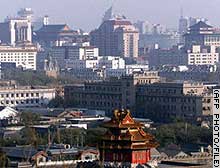 Fortunately the commerical buildings and government buildings look a bit more inspired. The commercial and shopping districts could easily be mistaken for that of a large North American city. It's very modern, and sometimes it's very painful to look at, as various architectural styles clash with each other in the Beijing skyline.
Fortunately the commerical buildings and government buildings look a bit more inspired. The commercial and shopping districts could easily be mistaken for that of a large North American city. It's very modern, and sometimes it's very painful to look at, as various architectural styles clash with each other in the Beijing skyline.
China is modernizing itself, but this process is very uneven. As a result, traditional aspects and modern aspects are often beside each other. Uneven modernization will expand the rift between the lower class and the upper class. This class divide is obvious in China, with some people earning only 200 yuan per month, while others earn 2,000 yuan per month, while others earn 200,000 yuan per month. For the moment, people are willing to accept this for what it is... but as modernization continues, who's to say they will accept it in the future?
I got a good look at the architecture of Beijing as I was flying into the city. As my friend actually decribed it, parts of the city look like Monopoly hotels. When someone builds an apartment complex in Beijing, they don't build one of them... they build 8 or 10 or 12 of them at a time. Unfortunately, they also build them exactly alike, so these apartment complexes will look exactly the same. Not to worry, because there will be another set of 8 or 10 or 12 apartment complexes will be built right beside them that will look different. The general theme here is that the majority of residential housing in Beijing is fairly plain.
 Fortunately the commerical buildings and government buildings look a bit more inspired. The commercial and shopping districts could easily be mistaken for that of a large North American city. It's very modern, and sometimes it's very painful to look at, as various architectural styles clash with each other in the Beijing skyline.
Fortunately the commerical buildings and government buildings look a bit more inspired. The commercial and shopping districts could easily be mistaken for that of a large North American city. It's very modern, and sometimes it's very painful to look at, as various architectural styles clash with each other in the Beijing skyline.China is modernizing itself, but this process is very uneven. As a result, traditional aspects and modern aspects are often beside each other. Uneven modernization will expand the rift between the lower class and the upper class. This class divide is obvious in China, with some people earning only 200 yuan per month, while others earn 2,000 yuan per month, while others earn 200,000 yuan per month. For the moment, people are willing to accept this for what it is... but as modernization continues, who's to say they will accept it in the future?
Beijing: Transportation
Beijing is easily the largest city that I've been in. It's packed full of people who all have places to go. As you can imagine, this makes traffic very interesting. Most of the major streets in Beijing resemble highways. They are four lanes each way, plus a bicycle lane, making most major streets 9 lanes wide. The actual flow of traffic is a little different than in North American. The flow of traffic never seems to stop, even if there are accidents or obstructions. Like water in a stony river, traffic will go around things that block their way or drive in between lanes if there is space. This close-quarters driving must have evolved from bicycle traffic, as you will see a lot of cyclists doing this sort of thing in North America.
The cars in Beijing and most of China are predominately small European cars, specifially Volkswagons. There were also Korean and Chinese models. (Japanese cars were not as popular as I thought they would be, but there may be historical reasons for that.) American cars were very rare, but I did see a few Fords on the road. Cars have become a status symbol in China. It means something if you have a car. It really means something if you have a black Audi or a black Mercedes-Benz. Personally, I'm a fan of bikes, and there are still plenty of those to be found on the road, even on a cold December night.
If you can't afford a car, or want to avoid the slow traffic of rush hour, Beijing has a very effective subway system that only costs 3 yuan to take. In contrast, their bus system is very strange. There are official buses that follow fixed routes and require fixed fares of 2 yuan. Aside from the official buses there are another class of buses which look a little more shady. I'm not sure if these other buses are legit or not, but you can flag then down anywhere, and if you are travelling a short distance, then you can try to haggle down your fare. These buses are very tightly packed, and I really wonder if they are just some local guys that rented an old bus to make money. I've seen official buses and shady buses race each other and cut each other off to get customers. Personally, I think this is something I'd like to see in Toronto, with the TTC being a little too complacent with their transit monopoly.
Taxis can be found everywhere, and they are a small luxury to those that can afford it. The average taxi trip costs between 15 to 30 yuan. There are some taxi options in China that we don't have here. Aside from they standard taxi car, they also have 3-wheeled cycle-taxis with an enclosed passenger cabin in the back. These seem to have replaced the old rickshaws, especially because they are faster. A similar option is the 3-wheeled motorcycle-taxi with passenger cabin. We actually took one of these, and found it to be a noisy but fast way to get around. It's really a down-to-earth way to travel because you can feel every bump or hole on the road when you are in one of those things. I loved the run-down appearance of some of them, because you think the whole thing is going to fall apart on you when you reach the next intersection. Very exciting.
Of course, my favorite transportation method in China was "some guy with a car." When you walk out of a subway station or restaurant, some guy will approach you and quietly ask if you need a lift. You haggle a reasonable price and get into his car. This practice is competely illegal, but nobody seems to care. One of the things they like to do is to park in front of an apartment complex and give people a ride to the subway station. They will only go once the car is full, so you may be waiting for a 3rd or 4th person to hop into the car with you before his drives everyone to the station.
The cars in Beijing and most of China are predominately small European cars, specifially Volkswagons. There were also Korean and Chinese models. (Japanese cars were not as popular as I thought they would be, but there may be historical reasons for that.) American cars were very rare, but I did see a few Fords on the road. Cars have become a status symbol in China. It means something if you have a car. It really means something if you have a black Audi or a black Mercedes-Benz. Personally, I'm a fan of bikes, and there are still plenty of those to be found on the road, even on a cold December night.
If you can't afford a car, or want to avoid the slow traffic of rush hour, Beijing has a very effective subway system that only costs 3 yuan to take. In contrast, their bus system is very strange. There are official buses that follow fixed routes and require fixed fares of 2 yuan. Aside from the official buses there are another class of buses which look a little more shady. I'm not sure if these other buses are legit or not, but you can flag then down anywhere, and if you are travelling a short distance, then you can try to haggle down your fare. These buses are very tightly packed, and I really wonder if they are just some local guys that rented an old bus to make money. I've seen official buses and shady buses race each other and cut each other off to get customers. Personally, I think this is something I'd like to see in Toronto, with the TTC being a little too complacent with their transit monopoly.
Taxis can be found everywhere, and they are a small luxury to those that can afford it. The average taxi trip costs between 15 to 30 yuan. There are some taxi options in China that we don't have here. Aside from they standard taxi car, they also have 3-wheeled cycle-taxis with an enclosed passenger cabin in the back. These seem to have replaced the old rickshaws, especially because they are faster. A similar option is the 3-wheeled motorcycle-taxi with passenger cabin. We actually took one of these, and found it to be a noisy but fast way to get around. It's really a down-to-earth way to travel because you can feel every bump or hole on the road when you are in one of those things. I loved the run-down appearance of some of them, because you think the whole thing is going to fall apart on you when you reach the next intersection. Very exciting.
Of course, my favorite transportation method in China was "some guy with a car." When you walk out of a subway station or restaurant, some guy will approach you and quietly ask if you need a lift. You haggle a reasonable price and get into his car. This practice is competely illegal, but nobody seems to care. One of the things they like to do is to park in front of an apartment complex and give people a ride to the subway station. They will only go once the car is full, so you may be waiting for a 3rd or 4th person to hop into the car with you before his drives everyone to the station.
Sunday, January 01, 2006
Background
Being a Canadian-born Asian, I have never actually been to China before. Having been to Europe twice already, I decided to correct this situation by visiting the world's most populated nation in December 2005. This idea would have been unthinkable if it were not for my girlfriend who grew up in China, and fluent in various dialects of Mandarin.
We have returned from the 3 week trip today, and it was quite an experience. I have ventured through different cultures before, but never one as different as China. Centuries ago, China was viewed as a mysterious exotic place, and such an aura still exists today... but in a much different light.
China is a society that is opening up it's economic and social boundaries. It's undergoing tremendous change, which will result in two possible scenarios. China will either emerge as a new superpower that may rival the United States, or China will collapse under the pressures of rapid change like the USSR. What will happen in the end is really a mystery, but one thing is certain: Change is happening in China.
We have returned from the 3 week trip today, and it was quite an experience. I have ventured through different cultures before, but never one as different as China. Centuries ago, China was viewed as a mysterious exotic place, and such an aura still exists today... but in a much different light.
China is a society that is opening up it's economic and social boundaries. It's undergoing tremendous change, which will result in two possible scenarios. China will either emerge as a new superpower that may rival the United States, or China will collapse under the pressures of rapid change like the USSR. What will happen in the end is really a mystery, but one thing is certain: Change is happening in China.
Subscribe to:
Posts (Atom)

